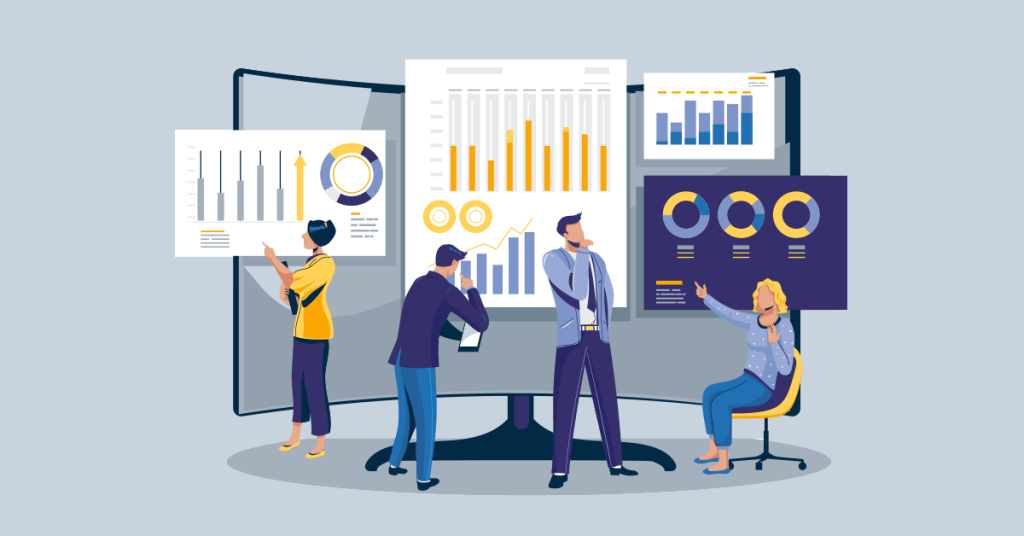Digital marketing algorithms are becoming a more significant component in determining the effectiveness and visibility of online material in the dynamic field of digital marketing. These algorithms are used by search engines and social media platforms, and they have the power to significantly impact how customers behave and interact with businesses.
Understanding these digital marketing algorithms and implementing the appropriate changes to work with them is crucial for marketers who wish to optimize the effectiveness of their campaigns and improve their online visibility.

You must approach these algorithms from several perspectives due to their complexity. Marketers must not only stay up to date on all the latest updates and modifications, but they must also create strategies that adhere to the unique specifications of every platform.
In-depth research on strategies for navigating digital marketing algorithms is presented in this article, along with helpful suggestions for increasing visibility, engagement, and eventually return on investment.
1. Decoding Algorithm Fundamentals
The algorithms used in digital marketing are developed to offer consumers material that is relevant and interesting to them. For example, the algorithms used by search engines like Google place a high priority on aspects such as the relevancy of keywords, the speed of websites, and their compatibility with mobile devices. To optimize a website and its content strategies to rank higher in search results, it is essential to have a solid understanding of these basic factors.
On the other hand,
“The algorithms used by social media platforms place a significant emphasis on the level of user participation as well as the quality of material. Posts that stimulate user involvement, such as comments, shares, and likes, have a higher priority on social media platforms such as Facebook and Instagram. When marketers have a good knowledge of these goals, they are better able to adjust their content strategy to enhance the interaction with their posts and the exposure of those posts”, says Josh Thill, Founder of Thrive Engine
2. Staying Updated with Algorithm Changes

Changes made to a digital marketing strategy’s algorithms can have a substantial impact on how effective that strategy is. For instance, Google constantly adjusts the algorithm that powers its search results, which may have an impact on the ranks and traffic of a website. Marketers have a responsibility to keep abreast of these shifts by frequently monitoring industry news, engaging in digital marketing-focused webinars and online forums, and reading digital marketing-related articles.
According to Shannon Coventry, Marketing Manager at First Vehicle Leasing, “To successfully adapt to algorithm changes, one must be flexible and willing to make adjustments to one’s methods. Marketers can more easily change their strategies if they undertake regular analysis of the effectiveness of their campaigns and keep up with developments in their sector. Because of this proactive strategy, marketing initiatives are certain to continue to be effective despite the rapid evolution of the digital scene.”
3. Enhancing SEO Strategies
Optimizing a website for search engines using search engine optimization (SEO) is essential to increasing its presence in search engine results. This includes optimizing the website content with relevant keywords, making sure the site layout is favorable to search engines, and creating quality backlinks. A website’s rating and the amount of organic traffic it receives may both be considerably improved by properly implementing an SEO plan, for which you may consider consulting a specialized e-learning SEO company. If you had any project in the past, consider a SEO migration, to give yourself a head start, rather than starting from zero.
In addition to this, “it is crucial to keep up to speed with the latest SEO trends and algorithm adjustments. This involves optimizing the website for voice search, putting an emphasis on local SEO, and making certain that the website is both mobile-friendly and safe. Marketers may maintain a competitive advantage in the highly competitive digital environment by continually improving the SEO methods they employ” says, Craig Campbell, Owner of HARO Link Building
4. Prioritizing High-Quality Content

When it comes to meeting algorithm criteria across different platforms, having material of high quality is one of the most important factors. Content that is not just educational but also well-written and interesting to readers has a greater likelihood of ranking higher in search engines and garnering more interaction on social media. This involves developing engaging content such as informative blog articles, interactive videos, and eye-catching visuals that speak directly to the audience in question.
Marie Ysais, Founder of Ysais Digital Marketing asserts, “The delivery of excellent material constantly helps to position a business as an expert in its industry, which encourages return visits and increased engagement rates. This not only boosts the website’s algorithmic rating but also increases the audience’s trust in the brand and strengthens its reputation. The primary goal of marketers should be the production of content that not only resonates with their target demographic but also conforms to the standards of excellence established by each platform.”
5. Leveraging Data Analytics
The analysis of data is a strong tool that may be used to gain a better understanding of how the material interacts with algorithms. Marketers may acquire insights into what content connects with their audience and how algorithms are responding to their strategy by evaluating metrics such as engagement rates, click-through rates, and conversion rates.
“Marketers can watch user activity, identify effective content, and make choices based on the data collected using technologies such as Google Analytics for websites and platform-specific analytics for social media platforms. This information is extremely helpful for tweaking content so that it aligns with the preferences of the algorithm and improves the performance of the campaign as a whole” said, Adam Crossling, Marketing & New Business Director at zenzero
6. Engaging with the Audience

It is essential to actively engage the audience to improve the performance of content using algorithms. Posts that create a significant amount of user interaction are rewarded on social media platforms such as Facebook and Instagram. This includes encouraging users to comment, share, and like content, all of which have the potential to extend the posts’ reach and exposure.
“Building a conversation with the audience by interacting with them regularly, such as by replying to comments and providing material driven by the community, is another way to cultivate a devoted following. This not only improves the efficacy of the algorithm but also improves the entire brand experience for users, which ultimately leads to improved engagement and customer retention rates” says, Cameron Holland, Marketing Director at GB Foam
7. Exploring Paid Advertising
Paid advertising may give a considerable boost in overcoming the constraints imposed by algorithms, in addition to the importance of organic tactics. Platforms provide possibilities for tailored advertising, which enables marketers to contact consumers who fit particular demographic profiles and exhibit particular interests and behaviors. This guarantees that the material is sent to the audience who will find it most relevant, which may increase engagement and conversions.
According to Sasha Quail, Business Development Manager of claims.co.uk, “Paid advertising also has the benefit of providing extensive analytics, which enables marketers to evaluate the efficiency of their advertisements and make modifications based on the information provided by the data. Marketers may successfully complement their organic efforts and increase their reach by carefully implementing paid advertising into their entire digital marketing plan. This allows them to effectively complement their organic efforts.”
8. Diversifying Across Platforms

The danger of having one’s marketing efforts negatively affected by a change in the algorithm of a single platform can be reduced by diversifying such efforts over many platforms. Because each platform is aimed at a distinct subset of the user population and implements its own set of algorithms, there are several chances to customize content strategy accordingly. For instance, successful strategies on Instagram might not translate to the same level of success on LinkedIn.
“The use of many platforms enables marketers to reach a larger audience while also capitalizing on the advantages offered by each platform. This could include utilizing a combination of paid advertising, social media marketing, email marketing, and content marketing. Marketers can establish a more consistent and successful digital presence if they distribute their efforts over a variety of platforms” said, Timothy Allen, Director at Corporate Investigation Consulting
9. Testing and Experimenting
To fully comprehend the complexities of the various algorithms, consistent testing and experimentation are essential. This can mean trying out a variety of various kinds of material, playing around with different publishing hours, or switching up the posting frequency. The use of A/B testing is one of the most effective methods for understanding what connects most strongly with audiences and algorithms.
The findings of these tests should be utilized by marketers in a continual process of strategy development and improvement. This iterative approach assists in determining the most successful strategies for connecting with the audience and customizing material for the preferences of the algorithm, which ultimately leads to improved overall performance.
10. Building a Community
The creation of an active community around a brand has the potential to have a big influence on the way algorithms rank content. To develop a community, you need to maintain constant interaction, share meaningful information, and work to instill a sense of belonging in your followers. This has the potential to result in increased engagement rates, which, in turn, boosts the website’s exposure in the algorithmic rankings.
Not only can an engaged and devoted community improve algorithmic performance, but it also boosts word-of-mouth marketing and fortifies customer loyalty. The primary focus of marketers should be on cultivating these connections by distributing unique content, participating in meaningful conversations, and recognizing and rewarding members of active communities.
Importance of Algorithms in Digital Marketing
In digital marketing, algorithms are a double-edged sword because, although they have the potential to expand the reach and effect of content, they also have the potential to make it difficult for marketers to maintain exposure and engagement.
Because of this complexity, it is necessary to take a multidimensional strategy, in which it is crucial to remain up to speed on the latest algorithm modifications and to adjust tactics to the individual requirements of each platform.
Blending knowledge that is up to date with new techniques that are platform-specific is the key to ensuring that campaigns continue to be effective and visible in a digital world that is always shifting and developing.
Embracing AI and Machine Learning
Artificial intelligence (AI) and machine learning (ML) are playing an increasingly important part in the development of digital marketing algorithms. These technologies make it possible for platforms to examine huge amounts of data and the behavior of users, allowing the platforms’ algorithms to be refined to provide information that is more tailored and relevant.
Marketers may automate portions of their marketing plan, such as the generation of tailored content and targeted advertising, by leveraging AI and ML tools. These tools allow marketers to better understand the preferences of their customers, forecast trends, and more.
For instance, chatbots driven by AI can improve customer service, and machine learning algorithms can assist in optimizing advertising expenditures. Marketers can stay ahead of the algorithm game and ensure that their content continues to be highly visible and relevant to their target audience by integrating artificial intelligence and machine learning into their tactics.
Focusing on Ethical Marketing Practices
In response to the growing emphasis placed on the protection of personal data and on ethically conducting business, algorithms are also being developed to give preference to material that complies with ethical norms.
Because of this transition, marketers need to place a larger focus on responsible and transparent marketing strategies. It is more critical than ever before to prevent deceptive strategies, ensure compliance with data protection standards, and respect user privacy.
Businesses not only align themselves with the preferences of algorithms but also develop trust with their audience when they emphasize ethical marketing practices. Because of this trust, there is a greater level of engagement, improved customer retention, and ultimately, a stronger reputation for the business.
In today’s rapidly developing digital world, ethical marketing practices are not just a legal need but also a competitive advantage.
Conclusion
The issue of successfully navigating the intricacies of digital marketing algorithms is a continuing one that calls for an approach that is both strategic and flexible.
Marketers may maximize the effectiveness of their digital strategy by first gaining a grasp of the fundamentals, then keeping up current with developments, then concentrating on producing high-quality content, and lastly interacting with people across many platforms.
To be successful in this field, one must be ready to continually learn new things, explore, and develop new techniques to align themselves with the ever-shifting dynamics of digital algorithms.

